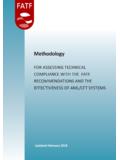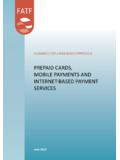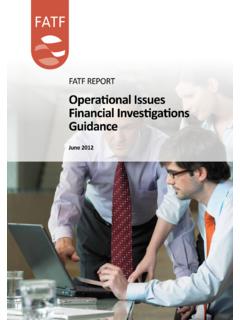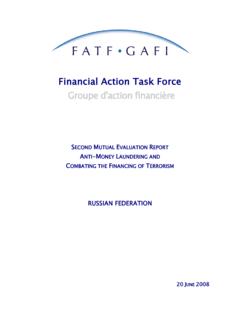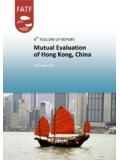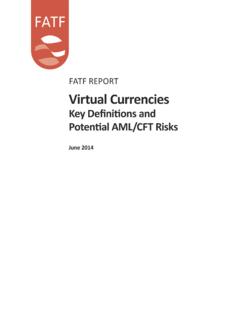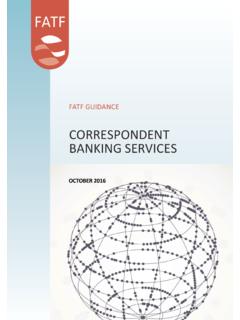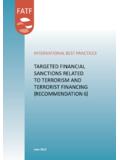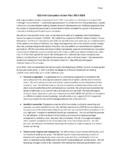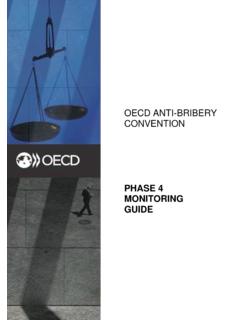Transcription of FATF Recommendations Media Narrative - FATF-GAFI.ORG
1 1 fatf Recommendations Media Narrative Money laundering, terrorist financing, and the financing of the proliferation of weapons of mass destruction are serious threats to global security and the integrity of the financial system. The fatf is the global standard-setter for measures to combat these threats. The fatf s standards (the fatf Recommendations ) are applied by over 180 countries, through a global network of regional bodies affiliated to the fatf . The fatf Recommendations require all countries to have effective systems for preventing and addressing money laundering, terrorist financing and the financing of proliferation. The Recommendations set out the measures that countries should have in place within their criminal justice and regulatory systems; the preventive measures to be taken by financial institutions and other businesses and professions; measures to ensure transparency on the ownership of legal persons and arrangements; the establishment of competent authorities with appropriate functions, and powers and mechanism for cooperation; and arrangements to cooperate with other countries.
2 The fatf standards have been revised to strengthen global safeguards and further protect the integrity of the financial system by providing governments with stronger tools to take action against serious crime. The revision of the Recommendations aims at achieving a balance: On the one hand, the requirements have been specifically strengthened in areas which are higher risk or where implementation could be enhanced. They have been expanded to deal with new threats such as the financing of proliferation of weapons of mass destruction, and to be clearer on transparency and tougher on corruption. On the other, they are also better targeted The risk-based approach will allow financial institutions and other designated sectors to apply their resources more efficiently by focusing on higher risk areas while there is more flexibility for simplified measures to be applied in low risk areas.
3 The fatf Recommendations are the basis on which all countries should meet the shared objective of tackling money laundering, terrorist financing and the financing of proliferation. The fatf calls upon all countries to effectively implement these measures in their national systems. Key Changes to the Standards (the fatf Recommendations ): The Risk-based approach: Countries need to clearly understand the money laundering and terrorist financing risks which affect them, and adapt their anti-money laundering/countering the financing of terrorism (AML/CFT) system to the nature of these risks by applying enhanced measures where the risks are higher with the option of simplified measures where the risks are lower.
4 The fatf has established the risk-based approach which will enable countries and financial intermediaries to target their resources more effectively. A well-implemented risk-based approach means that the AML/CFT system will be more effective, and will help countries implement measures to encourage financial inclusion, as called for by the G20. Transparency: Lack of transparency about the ownership and control of legal persons and legal arrangements, or about the parties to wire transfers, makes those instruments vulnerable to misuse by criminals and terrorists. The fatf has strengthened transparency requirements in these areas. This means requiring that there is reliable information available about the beneficial ownership and control of companies, trusts, and other legal persons or legal arrangements.
5 It also means more 2 rigorous requirements on the information which must accompany wire transfers. Measures to improve transparency, implemented on a global basis, will make it harder for criminals and terrorists to conceal their activities. International Cooperation: With the increasing globalisation of money laundering and terrorist financing threats, the fatf has also enhanced the scope and application of international cooperation between authorities. The revised Recommendations will mean more effective exchanges of information for investigative, supervisory and prosecutorial purposes. This will also assist countries in tracing, freezing, and confiscating illegal assets.
6 Operational Standards: The fatf Recommendations concerned with law enforcement and Financial Intelligence Units have been expanded significantly. The revisions clarify the role and functions of the operational agencies responsible for combating money laundering and terrorist financing and set out the range of investigative techniques and powers which should be available to them, , to obtain and analyse financial information about a suspected criminal s accounts and transactions New Threats & New Priorities: The fatf is addressing new and aggravated threats and responding to the priorities set out by the international community, through the G20. The key issues addressed are: - Financing of Proliferation - The proliferation of weapons of mass destruction is a significant security concern, and financial measures can be an effective way to combat this threat.
7 The fatf has adopted a new Recommendation aimed at ensuring consistent and effective implementation of targeted financial sanctions when these are called for by the UN Security Council. - Corruption & Politically Exposed Persons - The fatf Recommendations strengthen the requirements on financial institutions to identify politically exposed persons (PEPs) who may represent a higher risk of corruption by virtue of the positions they hold. The existing requirement to apply enhanced due diligence to PEPs has been extended from foreign PEPs, with new risk-based requirements applied to domestic PEPs and PEPs from international organisations, and to the family and close associates of all PEPs reflecting the methods used by corrupt officials and kleptocrats to launder the proceeds of corruption.
8 - Tax Crimes - The list of predicate offences for money laundering has been expanded to include serious tax crimes. This will bring the proceeds of tax crimes within the scope of the powers and authorities used to investigate money laundering. The smuggling offence has also been clarified to include offences relating to customs and excise duties and taxes. This will contribute to better coordination between law enforcement, border and tax authorities, and remove potential obstacles to international cooperation regarding tax crimes. Terrorist Financing The financing of terrorism remains a serious concern for the international community, and remains a major focus of the fatf Standards.
9 The fatf s nine Special Recommendations on terrorist financing have been integrated fully within the Forty Recommendations , reflecting both the fact that terrorist financing is a long-standing concern, and the close connections between anti-money laundering measures and measures to counter the financing of terrorism. Clarifying obligations: The fatf has updated its Recommendations to reflect practices in the financial sector ( , to set out clearer requirements for financial groups) and to apply the experience gained from the implementation of the fatf Recommendations by countries ( , by clarifying customer due-diligence requirements where countries have had practical difficulties with implementation).
10 3 The fatf has intensified its interaction with the private sector and civil society. fatf Recommendations have been updated to respond to issues raised by the private sector and civil society, and the revisions have been developed on the basis of extensive public consultation. The fatf and the fatf -Style Regional Bodies (FSRBs) The fatf is the global standard-setter for measures to combat money laundering, terrorist financing, and (most recently) the financing of proliferation. It is an intergovernmental body with 36 members, and with the participation of over 180 countries through a global network of fatf -style regional bodies. The fatf Recommendations set clear requirements. These are supported by rigorous and objective assessments of how these requirements have been implemented in countries AML/CFT systems, through assessments conducted by the fatf , FSRBS, the IMF and World Bank.
